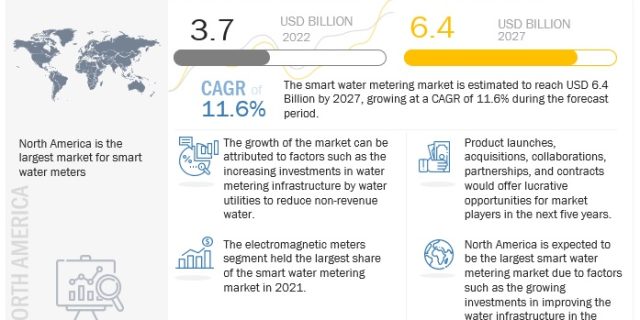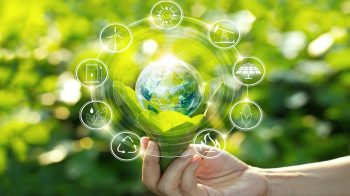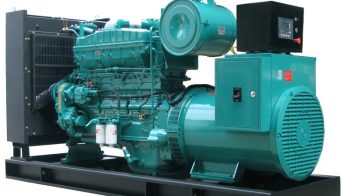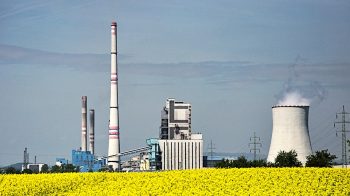
New Revenue Pockets:
The global Smart Water Metering Market is expected to grow at a CAGR of 11.6% during the forecast period, from an estimated USD 3.7 Billion in 2022 to USD 6.4 Billion in 2027. The rising urban population is creating opportunities for the development of smart cities, which ultimately is driving the demand for smart water metering infrastructure development on a larger scale. Another factor driving the market is the demand for accurate billing from residential users.
Download PDF Brochure – https://www.marketsandmarkets.com/pdfdownloadNew.asp?id=250996975
The utilities bear the cost of energy used to pump out non-revenue water and repair leaks. This results in increased operational costs and reduced efficiency. According to the Energy and Water department of the World Bank, water utilities globally lose an estimated USD 14 billion in non-revenue water every year. In the US, the federal government reported losses from leaks, which amount to an estimated 2.1 trillion gallons of NRW per year. According to the World Bank, the total cost to water utilities from NRW worldwide can be conservatively estimated at USD 141 billion per year—one-third of it occurs in developing economies. Smart water metering can reduce non-revenue water by 15–20%. Utilities can easily detect leaks in the water distribution network with the help of smart water metering infrastructure. The combination of leak sensors, communication devices, and data management software would help the utilities to quickly repair the leaks before the pipes burst and cause major damage. Thus, utilities can reduce their operational expenses and increase their efficiency. Countries are facing the constant issue of water loss and wastage. Also, governments are facing challenges in terms of developing sustainable infrastructure. Increasing breaches in access to water supply and sanitation, more water-intensive patterns of growth, growing populations, and water pollution are leading to increasing investments in the smart water metering infrastructure.
The quality of water meters is an important parameter because only a system that can perform frequent and accurate readings would allow a utility to both eliminate lost water and move away from estimate-based billing. Based on these demands, the global smart water metering market is segmented into Automatic Meter Reading (AMR) and Advanced Metering Infrastructure (AMI) technologies. AMI is used by various utilities for enabling remote metering when compared to AMR.
Smart water metering solutions find major applications in the water utilities segment, as water utilities around the globe are continuously focusing on reducing non-revenue water and developing an efficient metering infrastructure. In the coming years, the demand for smart water meters is expected to increase from the water utilities segment due to the growing focus on leakage detection and prevention, which are the key causes of large-volume water loss.
Ask Sample Pages – https://www.marketsandmarkets.com/requestsampleNew.asp?id=250996975
Water supply issues persist in developing countries; however, in industrialized countries, the water infrastructure built in the early 20th century has the least potential usage. According to the Environmental Protection Agency (EPA), USD 473 billion investment in drinking water infrastructure will be needed over the next 20 years as aging pipes and storage facilities require upgrades and replacements. The water industry is facing the issue of aging infrastructure as the installed conventional meters have worn out and lack accuracy in meter readings. The lack of smart water metering infrastructure limits the ability of water utilities to monitor and control the water distribution network. If the utilities install smart infrastructure, they can reduce their water losses and save up to USD 10.0 billion. In addition, the operational costs can also be reduced. The water-intensive industries are more inclined toward replacing conventional meters with technologically advanced smart water meters, as these meters have higher accuracy.


